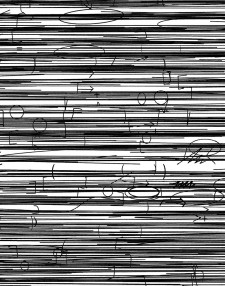Nick Thurston has published extensively and exhibited and performed internationally. Since 2006 he has been a co-editor of the imprint Information as Material, with whom he was 2011-12 Writer in Residence at the Whitechapel Gallery (London). In 2014 he was Artist in Residence at the Irish Museum of Modern Art (Dublin). He is currently Programme Director of undergraduate interdisciplinary Fine Art at the University of Leeds and Visiting Fellow in Contemporary Writing at the University of Pennsylvania (Philadelphia).

Authors | Nick Thurston
Articles on Amodern by Nick Thurston
AMODERN 6: READING THE ILLEGIBLE
The thought figure of the “illegible” binds a funny paradox. To be present, it has to register in some way(s) as the opposite of its conceptual identity – it has to work against its own negational value to work at all. For some, that is how sublation works; for others, it is a more negative dialectical resolution. Either way, if we do put it to work with and against itself, the concept of illegibility can allow us to organise modes and experiences of – plus experiments and performances with – acts of paying attention to things in the world that would likely otherwise go unread.
That was the broad impetus of this special issue: To imagine, in a scholarly or para-scholarly fashion, what we could explore, as writers and artists, if we took seriously the potential poetics of illegibility as a weird sub-category of the legible. With equal interest in technical and theoretical innovations, the following articles address issues of translation, transformation, feeling and “storying” the reading experience; of new and renewed trajectories in essayism, conceptualism, collaboration and the evaluation of style; and of redaction, glitches, automation and inattention. They do so with a reflexive willingness to read too closely, against norms, in a range of projects that are suggestive of ambitious new literacies.
With the title and intent of his 2003 monograph, American poet-critic Craig Dworkin staked the proposition that the present collection extends: “In short, the basic thesis of this book is ██████████.” Following his lead, in different ways, the contributors have been willing to invert the hierarchy of responsibility we normally assume when we dismiss things in the world as “illegible.” Their work deftly shows that the limits of legibility at any one time in human history are adduced from the horizons of our abilities and willingness to read, not from any fault, block, or lack on the part of worldly stuff.




